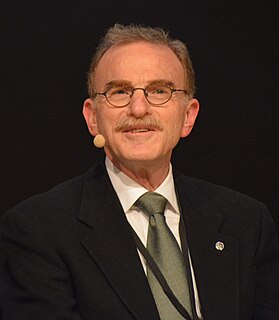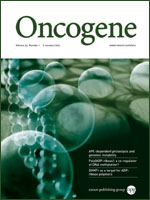
Randy Wayne Schekman is an American cell biologist at the University of California, Berkeley and former editor-in-chief of Proceedings of the National Academy of Sciences. In 2011, he was announced as the editor of eLife, a new high-profile open-access journal published by the Howard Hughes Medical Institute, the Max Planck Society and the Wellcome Trust launching in 2012. He was elected to the National Academy of Sciences in 1992. Schekman shared the 2013 Nobel Prize for Physiology or Medicine with James Rothman and Thomas C. Südhof for their ground-breaking work on cell membrane vesicle trafficking.

Nature Reviews Molecular Cell Biology is a peer-reviewed monthly review journal that was established in October 2000 and is published by Nature Publishing Group. It covers all aspects of molecular and cell biology.
Cell is a peer-reviewed scientific journal publishing research papers across a broad range of disciplines within the life sciences. Areas covered include molecular biology, cell biology, systems biology, stem cells, developmental biology, genetics and genomics, proteomics, cancer research, immunology, neuroscience, structural biology, microbiology, virology, physiology, biophysics, and computational biology. The journal was established in 1974 by Benjamin Lewin and is published twice monthly by Cell Press, an imprint of Elsevier.

Molecular Biology of the Cell is a biweekly peer-reviewed scientific journal published by the American Society for Cell Biology. It covers research on the molecular basis of cell structure and function. According to the Journal Citation Reports, the journal has a 2012 impact factor of 4.803. It was originally established as Cell Regulation in 1989.

Current Biology is a biweekly peer-reviewed scientific journal that covers all areas of biology, especially molecular biology, cell biology, genetics, neurobiology, ecology, and evolutionary biology. The journal includes research articles, various types of review articles, as well as an editorial magazine section. The journal was established in 1991 by the Current Science group, acquired by Elsevier in 1998 and has since 2001 been part of Cell Press, a subdivision of Elsevier.

Fiona Watt, is a British scientist who is internationally known for detailing the mechanisms that control epidermal stem cell renewal, differentiation, and tissue aggregation. She is also known for discovering how each of those processes' regulations are removed in diseased cells. She is director of the Centre for Stem Cells & Regenerative Medicine at Kings College London, and executive chair of the MRC.

Nature Structural & Molecular Biology is a monthly peer-reviewed scientific journal publishing research articles, reviews, news, and commentaries in structural and molecular biology, with an emphasis on papers that further a "functional and mechanistic understanding of how molecular components in a biological process work together".

Scott D. Emr is a cell biologist and molecular geneticist who is serving as the Frank H.T. Rhodes Class of '56 Director of the Weill Institute for Cell and Molecular Biology at Cornell University. He is also a Professor of Molecular Biology and Genetics in the College of Arts and Sciences at Cornell, an Adjunct Professor of Molecular Medicine in the College of Veterinary Medicine at Cornell, and a Professor of Biochemistry at the Weill Cornell Medical College.
Hans Robert Schöler is a molecular biologist and stem cell researcher. He is director at the Max Planck Institute for Molecular Biomedicine in Münster.

Nature Cell Biology is a peer-reviewed scientific journal covering research in cell biology published by the Nature Publishing Group. It was established in 1999 and the current editor-in-chief is Alexia-Ileana Zaromytidou.

Oncogene is a peer-reviewed scientific journal published by the Nature Publishing Group addressing cancer cell genetics and the structure and function of oncogenes.
Christopher J. Chang is a professor of chemistry at the Department of Chemistry, University of California, Berkeley, a recipient of several young scientist awards for his research in bioinorganic chemistry, molecular and chemical biology.
The following outline is provided as an overview of and topical guide to biophysics:
The Journal of Structural Biology is a peer-reviewed scientific journal concerning the structural analysis of biological materials at all levels of organization and the functional consequences of such observations. The editors-in-chief are A.C. Steven and Wolfgang Baumeister.

Yoshinori Ohsumi is a Japanese cell biologist specializing in autophagy, the process that cells use to destroy and recycle cellular components. Ohsumi is a professor at Tokyo Institute of Technology's Institute of Innovative Research. He received the Kyoto Prize for Basic Sciences in 2012, the 2016 Nobel Prize in Physiology or Medicine, and the 2017 Breakthrough Prize in Life Sciences for his discoveries of mechanisms for autophagy.
Zeng Rong is a Chinese biochemist researching and developing technology for proteomics research. She is currently a professor at the Institute of Biochemistry and Cell Biology at the Shanghai Institutes for Biological Sciences.
Cell Journal is a quarterly peer-reviewed scientific journal covering molecular and cell biology. It was established in 1999 as Yakhteh Medical Journal, obtaining its current name in 2010. It is published by the Royan Institute and the editor-in-chief is Ahmad Hosseini. According to the Journal Citation Reports, the journal has a 2017 impact factor of 2.363, ranking it 137th out of 190 journals in the category "Cell Biology".











